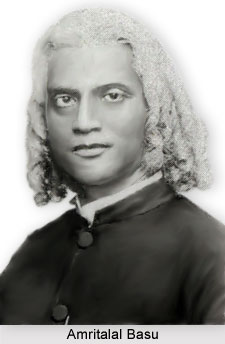 Amritalal Basu was a Bengali actor born in the year of 1853. This Bengali actor, playwright, and producer were closely associated with Girish Ghosh and Binodini Dasi. He debuted in the female role of Sairindhri at the historic inaugural performance of the first Bengali public playhouse in the Indian National Theatre on 7th December, 1872.
Amritalal Basu was a Bengali actor born in the year of 1853. This Bengali actor, playwright, and producer were closely associated with Girish Ghosh and Binodini Dasi. He debuted in the female role of Sairindhri at the historic inaugural performance of the first Bengali public playhouse in the Indian National Theatre on 7th December, 1872.
Biography of Amritalal Basu
His own first dramatic venture, Model School, was produced at the Opera House, Kolkata, in 1873. His play Hirakchurna or "Diamond Dust" was based on the dethronement of Malhar Rao Gaikwad of Baroda, accused of assassinating the British Resident. This play was staged by the Great National Theatre in 1875. On 4 March 1876, he was arrested along with Upendranath Das during a performance of Sati ki kalankini i.e. `Chaste or Fallen Woman` in 1874. They were released on 20 March as the allegations of obscenity in another production were unfounded. Joining the Star Theatre in 1884, he remained one of its proprietors till 1926.
Sir David Yule nicknamed Basu the `Irving of the East`. Amritalal Basu attained fame primarily as a comedian and writer of farces. Bengali theatre circles knew him as Rasaraj i.e. `Raja of wit`. Chatujye-Banrujye or `Chatterjees and Banerjees` in 1884, Kripaner dhan or `Miser`s Fortune` in 1900, Khasdakhal or `Occupied Property` in 1912, and Byapika biday or `Farewell, Virago` in 1926 achieved great popularity. His sketches, Raja Bahadur in 1891 and Babu in 1894, dramatizations of Bankim Chandra Chatterjee`s Chandrashekhar, Rajsinha, and Bisha-briksha i.e. `Poison Tree`, Sarala based on Taraknath Gangopadhyaya`s Swarnalata, and translation of Harsha`s Ratnavali secured him a place of honour. His characterizations of Wood in Dinabandhu Mitra`s Nildarpan, the eponymous Nasiram, Ramesh of Praphtdla, Purnaram Bhat of Chanda, and Karunamay of Balidan in Ghosh`s plays, and Behari Khuro of Tarubala, Foster and Chandrashekhar of Chandrashekhar, and Bishwamitra of Harishchandra in his own diverse creations immortalized him as an actor.
Basu`s recollections can be described as some compiled as Smriti o atmasmriti i.e. `Memoirs and Autobiography` in 1982. These are inexhaustible sources of information on the first fifty years of the Bengali public stage. His review of Rabindranath Tagore1923 production of Bisarjan or `Immersion`, stands out as a milestone of theatre appreciation in Bengal. Amritalal Basu died in the year 1929.




















